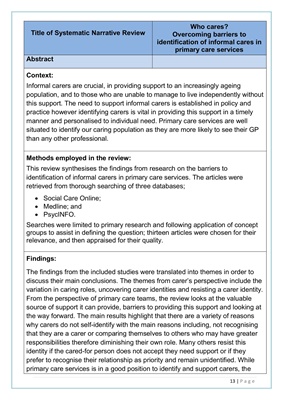
13 | P a g e
Title of Systematic Narrative Review
Who cares?
Overcoming barriers to
identification of informal cares in
primary care services
Abstract
Context:
Informal carers are crucial, in providing support to an increasingly ageing
population, and to those who are unable to manage to live independently without
this support. The need to support informal carers is established in policy and
practice however identifying carers is vital in providing this support in a timely
manner and personalised to individual need. Primary care services are well
situated to identify our caring population as they are more likely to see their GP
than any other professional.
Methods employed in the review:
This review synthesises the findings from research on the barriers to
identification of informal carers in primary care services. The articles were
retrieved from thorough searching of three databases;
• Social Care Online;
• Medline; and
• PsycINFO.
Searches were limited to primary research and following application of concept
groups to assist in defining the question; thirteen articles were chosen for their
relevance, and then appraised for their quality.
Findings:
The findings from the included studies were translated into themes in order to
discuss their main conclusions. The themes from carer's perspective include the
variation in caring roles, uncovering carer identities and resisting a carer identity.
From the perspective of primary care teams, the review looks at the valuable
source of support it can provide, barriers to providing this support and looking at
the way forward. The main results highlight that there are a variety of reasons
why carers do not self-identify with the main reasons including, not recognising
that they are a carer or comparing themselves to others who may have greater
responsibilities therefore diminishing their own role. Many others resist this
identity if the cared-for person does not accept they need support or if they
prefer to recognise their relationship as priority and remain unidentified. While
primary care services is in a good position to identify and support carers, the